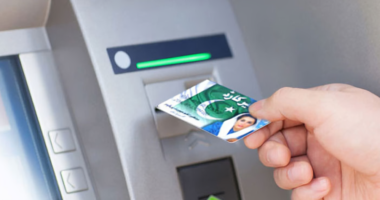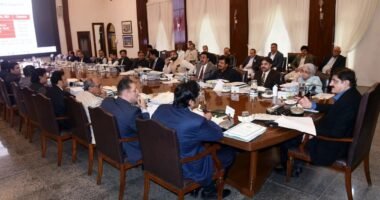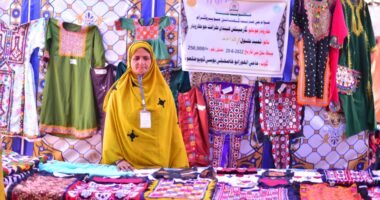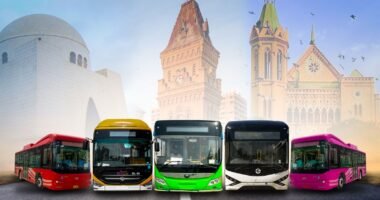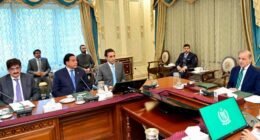
Sindh is witnessing a public transport revolution like never before, driven by an ambitious vision to make commuting safer, more affordable, and environmentally friendly for all citizens. This transformation is being spearheaded under the leadership of Chairman Bilawal Bhutto Zardari, and effectively executed by the Sindh Transport and Mass Transit Department and Sharjeel Inam Memon, Senior Minister Sindh and Minister for Transport and Mass Transit.
From launching Pakistan’s first electric bus service to introducing exclusive travel options for women, Sindh is rapidly emerging as a national model for urban transport innovation.
Peoples Bus Service: Affordable and Accessible Mobility Across Sindh
The Peoples Bus Service, commonly known as the Red Bus Service, is one of the most impactful public transport projects launched by the Government of Sindh. Introduced to bridge the gap between the people and efficient transport, the Red Buses operate in Karachi, Hyderabad, Sukkur, Mirpurkhas, Nawabshah, and Larkana. These air-conditioned buses run on modern routes with subsidized fares, providing clean, safe, and reliable travel for students, professionals, and the general public.
Thousands of commuters now benefit daily from this dependable system, significantly easing their travel burden and reducing dependency on expensive or unsafe transport options.
A Greener Tomorrow: Environment-Friendly Transport Initiatives
Sindh is taking firm steps to tackle urban pollution and promote sustainable living by introducing eco-friendly and smart transport solutions:
- White Electric Bus Service (Karachi)
Launched in Karachi, this service is Pakistan’s first fully electric bus fleet, a historic move toward reducing carbon emissions in public transport. The EV buses are not only cost-efficient in the long term but also help in decreasing air and noise pollution. - Green Hybrid Bus Service (Karachi)
Operating alongside the electric fleet, hybrid buses use both fuel and electric power, offering a transitional solution toward cleaner public mobility. These buses are designed to maximize energy efficiency and reduce environmental impact, especially during peak traffic hours in the city. - Orange Line BRT (Abdul Sattar Edhi Line)
As part of the broader Bus Rapid Transit system in Karachi, the Orange Line BRT provides a fast and dedicated corridor for buses to move without getting stuck in regular traffic. Named after the beloved humanitarian Abdul Sattar Edhi, this service connects densely populated areas with key commercial zones, reducing travel time and stress for thousands of daily commuters.
Women-Centric Transportation: Empowering Half the Population
A standout feature of Sindh’s transport revolution is its strong focus on women’s mobility, safety, and independence—an area often overlooked in traditional public transport planning.
- Pink Bus Service (Karachi)
Designed exclusively for female passengers, the Pink Bus offers a safe, respectful, and harassment-free space for women to travel. With women conductors and security measures in place, this initiative is helping women reclaim public spaces with confidence. - Upcoming Pink Taxis and EV Taxis
In an effort to expand women’s mobility options, the Sindh government is set to introduce Pink Taxis—driven by and for women—ensuring safety and comfort during their commutes. Electric Taxis will also be launched as a green, modern alternative for the general public. - Free Pink Scooties for Female Students and Working Women
Another ground-breaking initiative in the pipeline is the distribution of free pink scooties to female students and employed women. This scheme aims to empower women with independent, safe, and affordable personal transport. It is a significant step toward promoting gender equality and enabling women to participate more freely in education and the workforce.
Sindh Leading the Way: A Model for the Nation
The comprehensive and inclusive approach to transport taken by the Government of Sindh marks a major leap forward in Pakistan’s urban mobility landscape. With integrated planning, investment in technology, and a clear focus on social equity, Sindh’s transport reforms are being recognized both nationally and internationally.
These initiatives are not just about moving people—they’re about uplifting communities, creating economic opportunities, reducing environmental harm, and promoting a culture of dignity and respect in public spaces.
Conclusion
With a blend of innovation, inclusivity, and sustainability, Sindh’s public transport revolution stands as a beacon of progress for the rest of the country. Under the strategic guidance of Bilawal Bhutto Zardari and the active execution by Sharjeel Inam Memon, the province is not only upgrading buses and routes—it is changing lives.
As new services like pink taxis, electric taxis, and free scooties prepare to launch, one thing is clear: Sindh is driving forward into a smarter, safer, and more inclusive future


